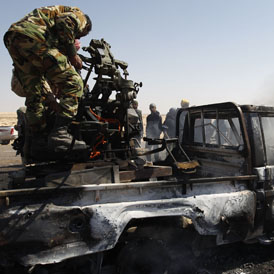No apology from NATO after Libya rebel deaths
NATO chiefs are unapologetic about air strikes hitting rebel tanks in Libya, leaving at least four rebels dead, but the Secretary General expressed “regret”, as Carl Dinnen reports.

Anders Fogh Rasmussen, Secretary General of NATO, said: “This is a very unfortunate incident. I strongly regret the loss of life.
“I can assure you we do our utmost to avoid civilian casualties.”
But the Deputy commander of NATO‘s operation in Libya, Rear Admiral Russ Harding, has said he is not apologising for the incident, which saw NATO forces strike opposition tanks on the road between Brega and Ajdabiya, leaving at least four people dead.
The Rear Admiral said the alliance was not aware that the Transitional National Council (TNC) forces were operating tanks, which had previously been used by Colonel Gaddafi‘s troops to attack civilians.
It is after TNC General Abdelfatah Yunis called for a “rational and convincing explanation” from NATO for the strike, in an area which has been the scene of much of the fighting over the last few days.
Deaths
Gen Yunis said he assumed that Thursday’s strike – the third such incident in recent days involving international forces – was “by mistake, friendly fire”.
At a press conference in Naples, Admiral Harding confirmed: “It would appear that two of our strikes yesterday may have resulted in the deaths of a number of TNC forces who were operating main battle tanks.
“The incident took place north-east of Brega, where fighting had gone back and forth on the road to Ajdabiya. The situation in that area is still very fluid, with tanks and other vehicles moving in different directions, making it very difficult to distinguish who may be operating them.
“In additon, until this time we had not seen the TNC operating tanks.
“It is important to stress that our mission is to protect civilians and we will continue to strike forces that could potentially cause harm to the people of Libya.”
Admiral Harding said there was no obligation on NATO to tell rebel forces where its planes are operating or to improve lines of communication with the Libyan opposition.
“I am not aware of what General Yunis has said, but I am not apologising,” he said.
I am not aware of what General Yunis has said, but I am not apologising. Rear Admiral Russ Harding
“The situation on the ground was extremely fluid and remains extremely fluid and up until yesterday we had no information that the TNC or the opposition forces were using tanks.
“There was equipment moving up and down the road between Brega and Ajdabiya going forward and coming back and our role is to protect civilians. Tanks have been used in the past to directly target civilians.”
Hague
Foreign Secretary William Hague called on NATO to apologise for the strike.
He said: “I think we should say that it is deeply regrettable and I think when something like this happens it doesn’t cost anything to apologise. So I think we should apologise where there is error. If people are killed who are not attacking civilians then it is a mistake.
“Mistakes do happen – and I think it is very important to point that out – in such a confusing situation, but certainly we should have no problem in saying we very much regret it.”
Channel 4 News special report - Libya war: strike against Gaddafi
More than 110 fast jet sorties will be flown over Libya over the next 24 hours, and 318 have taken place in the past 48 hours, he confirmed.
Since taking over command of the mission from the US, UK and France a week ago, NATO has been “steadily increasing” the tempo of operations, flying 1,500 sorties, of which more than half involved strikes. Nato planes – including RAF Tornados and Typhoons operating from Italy – are flying a total more than 600 hours a day.
-
Latest news
-
‘It was hard not to laugh on set’ – Swede Caroline lead on root vegetable mockumentary5m

-
Teachers to be allowed guns in Tennessee schools5m

-
Tory MP defects to Labour over NHS ‘chaos’2m

-
Al Sharpton on US campus wars and the US election race between ‘two old white men’5m

-
Israel-Gaza war continues to fuel protests and division in US, France and UK4m

-




